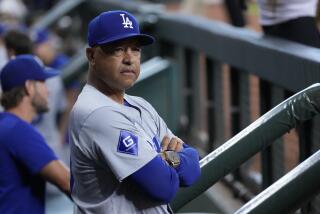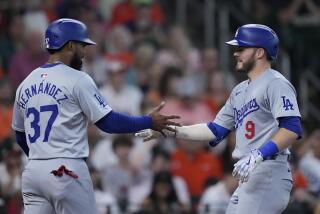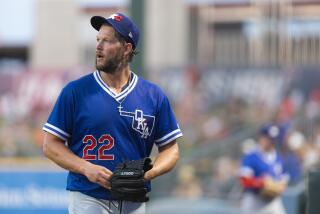More Wheeling Than Dealing?
Often resembling an expensive, nonstop swap meet, baseball’s annual winter convention opens at Nashville’s Opryland Hotel today, the market more resembling the melancholy pace of a country ballad.
Whether the clubs will continue to operate cautiously under the new labor agreement or respond to four days of lobby and closed-door mingling with a flurry of trades and signings isn’t certain, but there is no deadline attached to the meetings. It is safe to say that neither the Angels nor Dodgers sense an urgency to complete their winter business before leaving Nashville on Tuesday.
The Angels, of course, have it comparatively easy.
Thanks to Disney’s payroll generosity, their World Series winning roster will be virtually unchanged.
General Manager Bill Stoneman is basically looking to replace only reserve outfielders Orlando Palmeiro and Alex Ochoa.
A veteran of the Todd Hollandsworth, John Mabry or John Vander Wal caliber could fit one of those spots, and Stoneman might let farmhands Jeff DaVanon, Robb Quinlan, Barry Wesson and Nathan Haynes vie for the other.
Although left-handed reliever Scott Schoeneweis has asked to be traded, so that he can return to a starting rotation, Stoneman is unwilling to grant that request.
“At this point, what is best for the Angels and what is best for Scott’s career are not in unison,” agent Scott Boras conceded.
All of that, however, does not mean Stoneman will take his phone off the hook in Nashville.
Although it is a scenario that seems better suited for next winter, the expanded payroll might influence Stoneman to pursue a starting outfielder, not offer a contract to designated hitter Brad Fullmer, who would prefer to start regularly than platoon with Shawn Wooten, and use right fielder Tim Salmon as the DH. Said Stoneman, without specifically addressing that scenario, “At some point down the road, Tim will be a DH more than he has.”
The Dodgers, having created considerable roster and some financial flexibility with the trade that sent Eric Karros and Mark Grudzielanek to the Chicago Cubs, are still looking to fill their left-handed relief void and now must acquire a first baseman to replace Karros or an outfielder to replace Shawn Green, if the Dodgers take their right fielder up on his offer to move to first.
“I’m not going to Nashville thinking we have to leave with a finished product, but we will find out what some of our choices are,” General Manager Dan Evans said.
“A week ago we didn’t know if we had a chance [to move Karros and Grudzielanek], so we’re still in the preliminary stages of revisiting clubs and exploring our options. I’d be lying if I said we had a definitive route.”
The Dodgers would prefer to keep Green in the outfield but are determined to remain under the $117-million payroll tax threshold, which would seem to eliminate a free-agent hitter of Jeff Kent or Cliff Floyd’s magnitude, and means Evans probably has about $5 million to spend on both a hitter and left-handed reliever.
Evans wouldn’t discuss specific players, but among first basemen thought to be available in trade are Kevin Young, Sean Casey, Travis Lee, Derrick Lee, Raul Ibanez (primary an outfielder) and Erubiel Durazo.
Fred McGriff, who hit 30 home runs and drove in 103 runs for the Cubs, is an intriguing proposition as a free agent, given that he is 39 and might be willing to sign a one-year contract for a comparatively modest salary, enhancing the Dodgers’ flexibility in 2004.
The Dodgers, of course, are not alone in taking a conservative approach. The market was expected to undergo a correction in the first winter of a more restrictive labor agreement, and it has. Part of that is the agreement, part the overall economy. There have been only two major signings -- Jim Thome received a six-year, $85-million contract from the Philadelphia Phillies, and Tom Glavine received a three-year, $35-million contract from the New York Mets -- and both would have been even larger in previous winters.
Besides Kent, Floyd and McGriff, among still unsigned -- and largely unpursued -- free agents are Greg Maddux, Roger Clemens, Edgardo Alfonzo, Ivan Rodriguez and Reggie Sanders.
In addition, the free-agent class is expected to grow Dec. 20, when many familiar players are not tendered 2003 contracts by their current clubs, perhaps enhancing the pickings for patient general managers such as Evans.
That is one reason for thinking this year’s convention might not produce the usual number of trades. Another is that many clubs will be lined up at Omar Minaya’s door, holding off on any other move to first see if they can do business with the Montreal Expos’ general manager, whose list of available players could include Bartolo Colon, Jose Vidro, Javier Vazquez, Tony Armas Jr., and even Vladimir Guerrero. It is estimated that Minaya will need a payroll of $60 million-plus to keep the Expos together, but it is thought that the other 29 clubs, which continue to subsidize Minaya’s virtually homeless team, have authorized a payroll of only about $45 million.
“I think Montreal will have such a say in what happens this weekend that everything is pretty much at the Expos’ disposal,” Toronto Blue Jay General Manager J.P. Ricciardi said.
“So many teams have put everything on hold, wanting to see where they fit with them.”
*
Times staff writers Mike DiGiovanna and Bill Shaikin contributed to this report.
More to Read
Go beyond the scoreboard
Get the latest on L.A.'s teams in the daily Sports Report newsletter.
You may occasionally receive promotional content from the Los Angeles Times.





